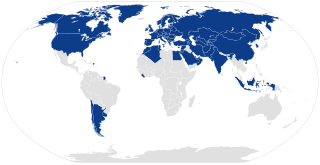Related Research Articles

Fajã is a Portuguese term of obscure origin used to describe supratidal talus at the foot of coastal cliffs, caused by landslides or lava flows. Although relatively common world-wide, they are distinctive features of the Azores and Madeira, as well as of the Canary Islands, where the equivalent term in Canarian Spanish is fajana. The term also designates a small flat piece of land, generally cultivable and located by the sea, formed of materials fallen from cliffs. Another Canarian word for lava fajanas is isla baja, literally, "low island".

Diogo Pinto de Freitas do Amaral was a Portuguese politician and law professor. He was Minister of Foreign Affairs from 10 January 1980 to 12 January 1981 and from 12 March 2005 to 3 July 2006. He also served briefly as Prime Minister in an interim capacity in the early 1980s, after the death of Francisco de Sá Carneiro.

The Convention on International Transport of Goods Under Cover of TIR Carnets is a multilateral treaty that was concluded at Geneva on 14 November 1975 to simplify and harmonise the administrative formalities of international road transport. The 1975 convention replaced the TIR Convention of 1959, which itself replaced the 1949 TIR Agreement between a number of European countries. The conventions were adopted under the auspices of the United Nations Economic Commission for Europe (UNECE). As of December 2020, there are 77 parties to the Convention, including 76 states and the European Union.

Peri-peri is a cultivar of Capsicum frutescens from the malagueta pepper. It was originally produced by Portuguese explorers in Portugal's former Southern African territories and then spread to other Portuguese domains.

Kimbundu, a Bantu language which has sometimes been called Mbundu or North Mbundu, is the second-most-widely-spoken Bantu language in Angola.

Antônio Houaiss was a Brazilian lexicographer, diplomat, writer and translator.
Hugo José Jorge O'Neill was the head of the Clanaboy O'Neill dynasty, whose family has been in Portugal since the 18th century.
Arguido or arguida, normally translated "named suspect" or "formal suspect", is a status in Portuguese type legal systems, including those of Portugal, Macau, Angola and Mozambique. It is given to a person whom the authorities suspect may have committed an offence. This designation does not exist in certain other jurisdictions. In a criminal investigation a person has to be declared an arguido prior to being arrested. Portuguese law makes a distinction between arguido and suspect.

The University of Cape Verde is the only public university of Cape Verde. The main campus is in Palmarejo, Praia, but there are also institutes in Mindelo, Assomada and São Jorge dos Órgãos. It has over 5000 students. A new campus for Uni-CV is under construction in Palmarejo, financed by the Chinese government. It should be completed by July 2020. It will have capacity for 4,890 students and 476 professors, with a library, dorms, cafeterias and sports facilities. It will have 61 class rooms, five auditoriums with a capacity of 150 seats, eight computer rooms, eight reading rooms and 34 laboratories.

The Portuguese Renaissance refers to the cultural and artistic movement in Portugal during the 15th and 16th centuries. Though the movement coincided with the Spanish and Italian Renaissances, the Portuguese Renaissance was largely separate from other European Renaissances and instead was extremely important in opening Europe to the unknown and bringing a more worldly view to those European Renaissances, as at the time the Portuguese Empire spanned the globe.
The 2012 Girabola was the 34th season of top-tier football in Angola. It ran from 3 March to 4 November 2012 and involved 16 teams, the bottom three of which were relegated to 2013 Segundona.

Xarém or xerém is a thick soup or porridge from Algarve, Portugal that is eaten in Cape Verde and Brazil as well. It has a corn flour base combined with other traditional ingredients which vary by region. The dish is prepared using corn meal, clams or sardines, and grilled meats. The Algarvian version is most commonly prepared using clams.

For the Brazilian footballer, see Mário Lúcio da Silva Junior

The 2020–21 Primeira Liga was the 87th season of the Primeira Liga, the top professional league for Portuguese association football clubs. The season started later than usual, on 18 September 2020, due to the delayed end of the previous season caused by the COVID-19 pandemic, and it concluded on 19 May 2021.

Éramos Seis is a Brazilian telenovela produced and broadcast by TV Globo. It premiered on 30 September 2019, replacing Órfãos da Terra, and ended on 27 March 2020. It is based on the book of the same name written by Maria José Dupré. The series is adapted by Ângela Chaves, with the collaboration of Bernardo Guilherme, Daisy Chaves and Juliana Peres.
Henri Ramirez is a French-Brazilian linguist known especially for his research on Arawakan languages and other language families of the Amazonian region. He is currently a professor at the Federal University of Rondônia, Guajará-Mirim.

João Alexandre Oliveira Nunes Henriques is a Portuguese professional football manager.
The Prego, also known as bitoque do prego, called prego no prato when served as a dish or prego no pão when served as a sandwich, is a typical Portuguese dish. It consists of a small beef patty which is normally served as a standalone dish or a sandwich, usually on a bolo do caco.
References
- ↑ "Amazon Launches Brazil Kindle Store (www.amazon.com.br) and Free Portuguese Kindle Reading Apps for Android Phones and Tablets, iPads and iPhones—R$299 Kindle Available in the Coming Weeks". Business Wire. 2012-06-12. Retrieved 2020-01-15.
- ↑ "Todo lo que debes saber sobre los diccionarios de Kindle | Guía de Kindle". September 5, 2018.
- ↑ "Kobo passa a usar dicionários da Priberam" (in Portuguese). Exame Informática. 2012-11-28. Retrieved 2020-01-15.
- 1 2 "Priberam. Quem é que criou o dicionário online mais famoso de Portugal?". MAGG (Interview) (in Portuguese). Interviewed by Ana Luísa Bernardino. 13 November 2019.
- ↑ "IST Spin-Off Community". tt.tecnico.ulisboa.pt. Retrieved 2020-01-15.
- ↑ "Priberam, a empresa mãe do dicionário mais conhecido da internet, faz 30 anos" (in Portuguese). Comunidade Cultura e Arte. 2019-10-01. Retrieved 2020-01-15.
- ↑ "Priberam faz 30 anos" (in Portuguese). PC Guia. 2020-10-01. Retrieved 2020-01-15.
- ↑ Figueira, H.; Mendes, A.; Mendes, P.; Pinto, C. (2009). "Implicações do acordo ortográfico da língua portuguesa de 1990 em programas informáticos de correção ortográfica". Revista Lusófona de Humanidades e Tecnologias. No. 12. Universidade Lusófona de Humanidades e Tecnologias. pp. 25–35.
- ↑ "Como a Priberam está a mudar o seu modelo de negócio com Machine Learning aplicado à língua". SAPO Tek (in Portuguese). SAPO. 2019-08-16. Retrieved 2020-01-15.